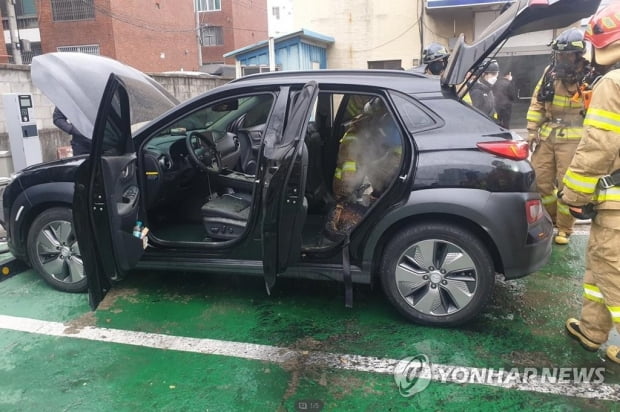Hyundai Motor Company and LG Energy Solutions agreed to share the cost of recalling the Kona electric vehicle (EV), which was recently controversial due to a series of fires, to 3 to 7 and reflected this as a provision.
LG Energy Solutions also turned to a deficit in the fourth quarter of last year.

According to the industry on the 5th, Hyundai Motor Company released a public announcement that corrected the previous year’s annual operating profit from 2.781.3 billion won to 2.3947 billion won the previous day.
This is because we added an additional provision of KRW 388.6 billion from the Kona EV recall in the fourth quarter of last year.
As last year’s earnings were adjusted due to the recall provision, Hyundai Motor’s annual operating profit for the past year reached a record low since the introduction of the new accounting standard (IFRS) in 2010.
The existing minimum was 2,422.2 billion won in 2018.
Last year’s operating profit decreased by 33.58% compared to 2019 (3.6 trillion won).
Annual net income decreased by KRW 193.2 billion from KRW 2,117.8 billion to KRW 1.92 trillion.
This is because the company reflected 2,135.2 billion won in quality expenses such as provisions related to the Theta 2 engine in the third quarter of last year, and was caught up in quality issues for the second consecutive quarter.
However, except for engine and battery-related quality costs, it actually exceeds the performance in 2019.
In particular, it was saved even in the situation where demand for the automobile industry contracted due to the new coronavirus infection (Corona 19) pandemic (a global pandemic) in the first half of last year.
Hyundai Motor’s last year’s sales fell 1.7% year-on-year to 10,3997 trillion won, reaching 100 trillion won for the second consecutive year after exceeding 100 trillion won in annual sales for the first time in 2019.

LG Chem, a subsidiary just before the spin-off of LG Energy Solutions, also announced in the disclosure of changes in its financial statements that last year’s operating profit decreased from 2,353.2 billion won to 1.79,82 billion won.
Consolidated operating profit in the fourth quarter of last year decreased from 6736 billion won to 118.6 billion won.
In the fourth quarter, net income turned to the red from 168 billion won to 3916 billion won in net loss.
Looking at LG Energy Solutions alone, operating profit was recorded for three consecutive quarters from the second quarter of last year, but this time reflecting the cost of the recall, it became inevitable to turn to the red in the fourth quarter.
LG Energy Solutions’ 4Q operating profit was 115.8 billion won.
Earlier, at the time of the announcement of the fourth quarter of last year, LG Chem said that it had previously accumulated provisions related to the recall of LG Energy Solutions.
Although the amount of provisions that have been accumulated has not been specifically disclosed, the securities industry estimates it at the beginning of 100 billion won.
If a provision of 500 billion won is added this time, provisions of more than 600 billion won will be reflected in relation to the Kona EV recall.
Including the 38.9 billion won previously reflected by Hyundai Motor, the provisions of both companies related to the recall of this electric vehicle amount to 1.1 trillion won.
However, based on Hyundai Motor’s provision for recall (425.5 billion won), the cost of the recall is estimated at 1.4 trillion won, which is more than the 1 trillion won announced by Hyundai Motor.

Since its launch in 2018, it is known that a total of 15 fires have occurred, including 11 domestic and 4 overseas cases.
As consumer anxiety increased due to the subsequent fires of Kona EV, Hyundai Motor Company produced Kona EVs (75,000 units), IONIQ EVs (5,716 units), and Electic Buses (produced from November 2017 to March 2020). 305 units), including a total of 81,701 units from around the world.
In Korea, the recall targets a total of 26,699 units, including 25,000 Kona EVs, 1,314 EVs for Ioniq, and 302 Elec Citys.
At the time of the first recall in October last year, the battery management system (BMS) was updated, and if any signs of battery abnormality such as excessive cell voltage deviation or rapid temperature change were found, the battery was replaced. Replace all of the vehicle’s high voltage battery system (BSA).
/yunhap news
